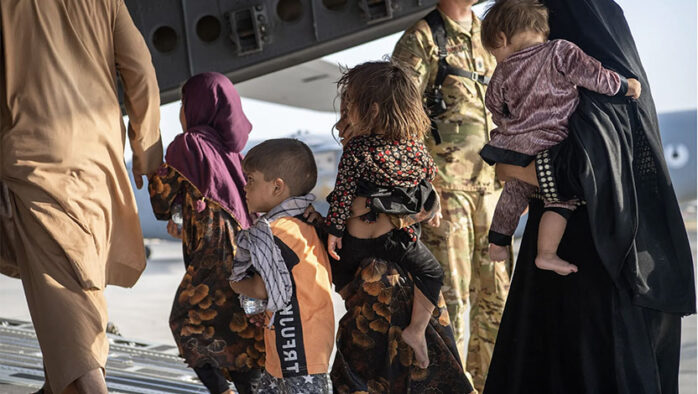
By Master Sgt. Donald R. Allen via U.S. Air Force
U.S. Air Force loadmasters and pilots assigned to the 816th Expeditionary Airlift Squadron,
load passengers aboard a U.S. Air Force C-17 Globemaster III in support of the Afghanistan
evacuation at Hamid Karzai International Airport in Afghanistan on Aug. 24, 2021.
Rutland among five cities selected to receive newcomers
By Tiffany Tan/VTDigger
Vermont officials have expressed willingness to accept 555 new refugees by next fall, though they said the number could decrease due to the state’s housing crisis.
By September 2024, some 330 refugees are expected to be resettled around Colchester, Montpelier and Rutland, and another 225 in the Bennington and Brattleboro areas, according to Tracy Dolan, Vermont’s state refugee office director.
If the effort is successful, the new arrivals will represent the biggest number of refugees resettled annually in Vermont in almost a decade. The plans align with the state government’s desire to integrate more refugees into the workforce and the fabric of Vermont life while responding to the global refugee crisis.
At the end of last year, according to UNHCR, there were 35.3 million refugees worldwide, more than half of whom originated from Syria, Ukraine and Afghanistan.
“I’m hoping that we’re able to continue to resettle, and resettle at the numbers that we need,” Dolan said in an interview. “Our workforce absolutely needs these folks, and communities have found it to be a very positive experience.”
But she acknowledged that Vermont’s projected refugee resettlement number for this federal fiscal year was “aspirational,” given the state’s low housing stock coupled with high housing costs.
“I wrote that to the feds, that I support this, but recognizing that we do have a housing crisis and it may need to change,” Dolan said, referring to communication with the U.S. Bureau of Population, Refugees and Migration.
Last fiscal year, Dolan said, Vermont received a little over 400 refugees, a broadly used term that includes humanitarian parolees, asylum seekers and holders of special immigrant visas, such as Afghans who’d worked with the U.S. military. The previous year, the state accepted 387 refugees, according to a January 2023 report to the state Legislature.
Dolan said the two federally contracted resettlement agencies in Vermont — the U.S. Committee for Refugees and Immigrants and the Ethiopian Community Development Council — inform the federal government the number of refugees they can relocate after consulting with the State Refugee Office and the host communities.
The development council’s Vermont branch, which is resettling refugees in the Bennington and Brattleboro areas, is already considering cutting its current projected number from 225 to 150 because of the statewide housing crisis.
“We have some concerns about our ability to resettle as many people as we thought, given the current state of housing,” said Mark Clark, the agency’s Vermont resettlement program manager. “We can get people employed, but we just can’t get access to safe and affordable housing.”
Gov. Phil Scott, who has advocated for Vermont to accept more refugees, acknowledged that the state’s lack of housing is a major problem for its resettlement efforts.
“We need people here in Vermont, and we have the jobs for people here in Vermont, but we don’t have the housing they need to be here,” Scott said in an interview Thursday, Dec. 28. “It’s a very frustrating dynamic, and we’re going to do everything we can.”
Scott said his administration will be introducing a package of housing proposals in the upcoming legislative session.
Vermont has consistently had some of the lowest housing vacancy rates in the nation, according to the Vermont Housing Finance Agency, which relied on U.S. Census Bureau data for its analysis.
As of 2022, the statewide rental vacancy rate stood at 3.2%. To meet expected demand and normalize the extremely low vacancy rate, the housing finance agency said in January, the state needs 30,000 to 40,000 new homes by 2030.
Meanwhile, the median housing rental cost as of 2021 was $1,070, an amount that included utilities.
When refugees arrive in the U.S., each person in a household receives $1,325 from the federal government to be used for their critical needs during the first 90 days, such as housing rent, food, clothing and furnishings.
Clark, of the development council, said people who resettle on their own have the hardest time making ends meet. For housing alone, they need the usual outlay of first and last month’s rent and security deposit. Some people, he said, have decided to seek housemates among fellow refugees to make their expenses more manageable.
To help defray the refugees’ initial living expenses, the development council collects donations for basics such as clothes, shoes, toiletry, household goods and furniture. Clark said development council staffers also help those who qualify to apply for government aid such as Medicaid, food benefits and cash assistance while they look for jobs.
Under the current state government budget, the State Refugee Office is allotted $1 million for employment assistance grants. Dolan, the office director, said the money goes to organizations such as nonprofits, which help refugees prepare to find local employment.
“Those employment rates are very high,” she said, estimating that around 80% of work-eligible refugees find jobs within their initial months in Vermont.
Dolan said the state contributes a small amount into a fund that resettlement agencies use to pay for hotels or motels if their clients can’t immediately find rental housing. The pot of money, she said, is primarily made up of federal funds, with private donations mixed in.
Clark said the development council also has been building relationships with landlords to help their clients find housing. The work, he said, includes explaining to landlords that refugees, being new to the U.S., don’t have a credit history and that the background checks they’ve undergone through the Department of Homeland Security, FBI and CIA should suffice.
“We don’t want our clients to ever become homeless,” he said.
Habib Sabet contributed reporting.



